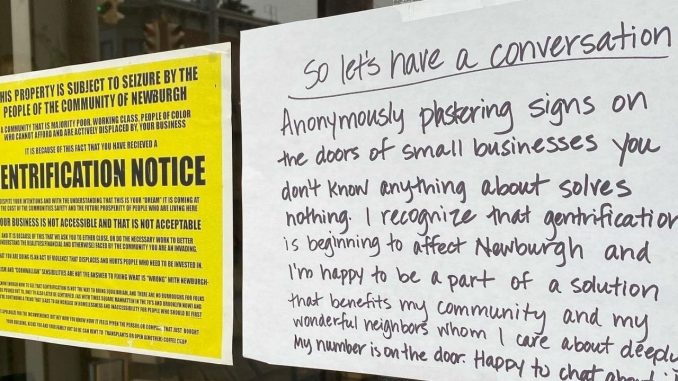
Since early October 2021, residents and shop owners in Newburgh, NY have seen “Gentrification Notices” that are anonymously being taped to the windows and storefronts of the ample amount of new businesses on Liberty Street that have opened up in the past few years.
The notices are asking businesses to cater more towards longtime city residents, not just tourists and wealthy clientele.
The notice reads, in all capital letters, “This property is subject to seizure by the people of the community of Newburgh. A community that is majority poor, working class, people of color who cannot afford and are actively displaced by your business. It is because of this fact that you are receiving a gentrification notice. Despite your intentions and with the understanding that this is your ‘dream,’ it is coming at the cost of the community’s safety and the future prosperity of the people that are living here. Your business is not accessible and that is not acceptable.”
The anonymous writer continues on. “It is because of this that we ask you to either close, or do the necessary work to better understand the realities (financial or otherwise) faced by the people in the community that you’re invading. What you are doing is an act of violence that displaces and hurts people who need to be invested in. Tourism and ‘cornwallian’ sensibilities are not the answer to fixing what is ‘wrong’ with Newburgh. We know enough about gentrification now to know that this is not the way to bring equilibrium.”
Nayib Portillo, 22, has lived in Newburgh his entire life and has watched it change immensely since his childhood.
“There’s definitely been a lot of changes here, earlier when I was a kid a lot of the homes near me were very run down or abandoned,” says Portillo. “But now some of them are being rebuilt and look a lot nicer and the roads have gotten somewhat better than they used to be. Recently, though, my apartment building got bought from my old landlord by some real estate business and they increased our rent so now I help chip in some money for my family to pay rent.”
According to Portillo, this phenomenon is not just affecting him, but affecting his entire community. “It’s definitely pushing people out of their homes, all of these new homes and apartments cost way too much that most people in Newburgh can’t even afford. And I’ve definitely forgotten what Liberty Street in front of the Washington headquarters used to look like before it got super gentrified,” says Nayib.
About 31% of Newburgh’s residents sit below the poverty line, which means that their annual income is less than $12,880. According to a poll taken by RENTCafe, the average cost of rent in Newburgh as of January 2022 is $1,667 per month, which has forced many long term residents out of their homes. Even those who can afford their rent are still living by meager means, as the average annual income for a Newburgh resident is $16,114.
Gentrification is notorious for disproportionately affecting marginalized and low-income communities. Low-income housing is becoming scarce, with many cities in the United States subject to gentrification, on top of the poverty line rapidly increasing, leaving a lot of families in the streets without a home.
Of that 31% of impoverished Newburgh residents the majority of them are minorities. Those of Hispanic descent take up 50.1%, with Black people taking up 26.7%.
Jackie Iorlano, one of the owners of Joe’s Pizza and Deli in Newburgh, has noticed over the course of her business’ 36 year lifespan that her childhood city has rapidly changed.
“At first, we were the only pizza place in Newburgh. Now, there’s like five or six within a half-mile,” Iorlano said. “I’ve seen a huge change, and while we still have our regular clientele who have been coming in with their families since we opened, our customer base has definitely changed over the past 15 years.”
Some of the business owners who have received these notices are unhappy with being singled out. Susan Kapnik, owner of Oliver & Chatfield Gift Shop, received one of the bright-yellow notices back in October, and decided to respond by placing her own sign next to it, which read, “Anonymously plastering signs on the doors of businesses that you know nothing about solves nothing. I recognize that gentrification is beginning to affect Newburgh and I’m happy to be a part of a solution that benefits my community and my wonderful neighbors whom I care about deeply. My number is on the door. Happy to chat about it.”
